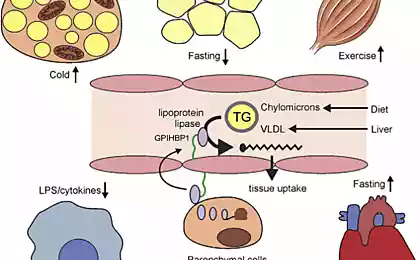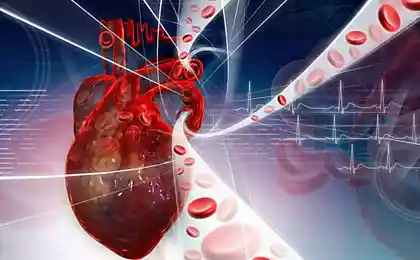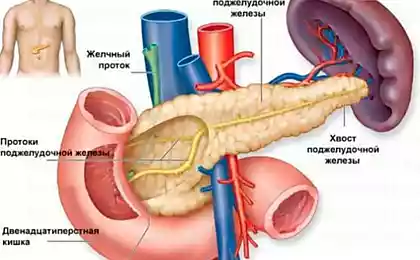311
12 Signs You Need to Add More Fat to Your Diet
Tina Larsson/Shutterstock.com
Many people suffer from problems with excess weight. These people, hoping to lose weight, sit on strict diets and exclude all fatty foods from the diet. And yet -- I bet you -- they never realized that not eating enough fat could be another problem.
The fact is that fats have a bad reputation, and so many tend to completely eliminate them from their diet. Others simply consume the “wrong” types of fat, which causes health problems: heart disease, diabetes, high cholesterol.
But if “bad” fats (saturated or trans fats) negatively affect your health, then monounsaturated and polyunsaturated fats, on the contrary, are useful, if you know the measure, of course.
Essential fatty acids (EFAs) such as omega-3s, which help our body in many ways, from reducing inflammation to preventing dementia.
So the big question is:
On what grounds can you determine whether there is enough fat in your diet?
Check out the list below: if there are any matches, it’s time to review your menu.
1. Your skin is dry.
Imcsike/Shutterstock.com
If you suffer from dry, itchy or scaly skin, try to eat more olive oil, nuts and avocados. They will provide your body with fatty acids that are needed for the sebaceous glands, natural skin moisturizers.
EFAs (omega-3 and omega-6), which enter the body with food, support the health of cell membranes and provide lipid production. Lipids do not allow water to evaporate through the skin, keeping it hydrated. That is why it is so important to get enough EFA.
In 2008, an experiment was conducted to find out how enotera oil (source omega-6) affects people with atopic dermatitis. After five months, 96% of the subjects who took the oil had a marked decrease in dry skin.
2. You often get angry and depressed. Interestingly, omega-3 and other fatty acids help to counter the development of depression. If your mood drops sharply, try eating fatty fish or flax seeds – it won’t take long and you’ll feel the difference.
Norwegian scientists conducted a study in which about 22 thousand people took part. As a result, it was found that people who regularly consume fish oil (rich in omega-3) are less likely to develop depression by 30%.
This is not the only study that confirms the positive effects of fat on mental health. There are others who prove that a lack of omega-3 in the body negatively affects the psyche. So, scientists found that an increase in the proportion of omega-3 in the diet affects a depressed person better than taking antidepressants.
But the lack of beneficial fatty acids often leads to excessive impulsivity, aggressiveness, cynicism and anger.
3. You get tired quickly.
Stock-Asso/Shutterstock.com
If you burn out before three in the afternoon or have difficulty getting out of bed in the morning, you may have low energy levels. Fuel for the body are proteins, fats and carbohydrates. At the same time, fats are the main source of energy.
Useful fats slow down the absorption of carbohydrates that enter the body along with food. This minimizes blood sugar spikes when we eat foods rich in fast carbohydrates (white bread, pasta).
A sharp jump in sugar is accompanied by a surge of strength. But when the sugar level begins to fall (and this happens very soon), the feeling of cheerfulness is replaced by a state of fatigue, lethargy and drowsiness.
Try adding a tablespoon of coconut oil to your coffee and you will see how it will add energy and vitality.
4. You're always hungry. If you feel a rumbling in your abdomen when less than an hour has passed since your last meal, this is a sign that your body may be lacking in fat.
Studies prove that taking even a small amount of dietary fat can satisfy hunger and reduce appetite. The same studies have shown that certain types of fats saturate better.
Food rich in polyunsaturated fats (fatty fish, walnuts) and saturated fatty acids (butter and ghee, lard), more satisfying than food that contains monounsaturated fats (avocado, olive oil, peanut butter).
However, in order to avoid health problems, it is not recommended to get more than 7% of daily calories from saturated fat.
You can add slices of avocado to sandwiches and pour olive oil on salads. In most cases, this will be enough.
5. You're always cold.
Ksenjavka/Shutterstock.com
Have you ever heard skinny people complain about being cold? Or how do overweight people suffer when summer comes? This is because dietary fats are involved in regulating baseline body temperature. Subcutaneous fat is needed by a person to retain heat in the body.
Moreover, subcutaneous fat protects the body from a sharp drop in temperature. In such cases, fat deposits release heat, which increases the temperature of the whole body.
Of course, there is a big difference between harmful fat in the abdomen and a thin layer of subcutaneous fat, which is good for the body.
6. You often can’t get your thoughts together. A high concentration of omega-3 is characteristic of the brain, so these fatty acids are considered critical for all higher mental functions (memory, thinking, speech).
In other words, if you often forget about your loved one’s meetings, activities, and birthday, you might want to reconsider your diet. And the sooner you begin to care about the presence of healthy fats in your diet, the sooner you will get results.
By the way, EFAs help fight attention deficit and hyperactivity in preschool children.
7. You can't lose weight.
wavebreakmedia/Shutterstock.com
This may sound counterintuitive, but I will explain.
If you remove all fats from the diet, the body will be forced to compensate for their lack of other nutrients: carbohydrates and proteins.
And it is no secret that in order to drive extra pounds, you need to eat less carbohydrates. So it turns out that by increasing the proportion of dietary fats in the diet, you reduce the body's need for carbohydrates. Without carbohydrates, which are fuel, the body will be forced to obtain energy by burning fat stores.
One gram of fat releases nine calories and carbohydrates and proteins four. This means that a handful of walnuts will charge you with more energy than a couple of cookies with sugar.
8. You have vision problems. Vision problems can be another sign that the body is lacking in fatty acids. Omega-3 acids protect the eyes from age-related macular degeneration, overpressure and glaucoma.
Macular degeneration is the most common cause of vision loss. A 12-year study found that people who consumed enough omega-3s were 30% less likely to develop macular degeneration.
But a diet high in harmful trans fats, on the contrary, contributes to the development of macular degeneration. Therefore, if you have eye problems, avoid frequent eating fried chicken, crackers and sweets.
EFAs have also been shown to help treat glaucoma, another common cause of vision loss.
9. Your joints hurt.
Dirima/Shutterstock.com
If you are an athlete and suffer from arthritis or just have joint pain, you should be careful to ensure that your diet includes enough fat.
Eating only “good” fats and avoiding “bad” fats will reduce the risk of inflammation throughout the body. This can help you fight arthritis.
What foods contain “good” fats? In olive oil, salmon, herring, sardine, walnuts.
In addition, omega-3 acids reduce joint stiffness in the morning and improve blood circulation during sports.
Of course, fats are a very high-calorie food, so know the measure.
10. You have high cholesterol. High levels of “bad” cholesterol (LDL, low-density lipoproteins) are known to increase the risk of heart disease. But did you know that just reducing your “bad” cholesterol isn’t enough? You also need to work on increasing the level of “good” cholesterol – HDL, high-density lipoproteins.
If the level of “good” cholesterol in your body is below normal, try eating more healthy fats. “Good” fats for “good” cholesterol. It's not too hard to remember, is it?
As scientists say, eating fatty fish (salmon, sardine, herring and mackerel) several times a week will dramatically increase the level of “good” cholesterol. If you don’t like or can’t eat that much fish, drink fish oil. He'll do the same job, just take longer.
11. You get tired quickly in crowded places.
View Apart/Shutterstock.com
If you become irritable and quickly fatigue in stadiums, bars or other places where there are a lot of people, the cause may be so-called sensory overload. Try adding more omega-3s to your diet and you’ll see how things change.
In 2009, scientists discovered that omega-3 fats help animals avoid sensory overload. The mice were exposed to increasing noise. The rodents who received enough omega-3s remained calm, while the rest were shocked by the loud noise.
Science tells us that a decrease in the concentration of omega-3s in the brain leads to a deterioration in mental abilities. If you work with your head, I recommend that you monitor the presence of fat in your daily diet.
12. You have vitamin deficiency. Perhaps, every person has periods when it seems that the battery is dead (apathy, do not want to do anything, drowsiness). This is often associated with a lack of vitamins. But the real problem may be that the body does not absorb (absorb) these vitamins.
Do you lack vitamins A, D, E and K? In fact, you may simply lack a small amount of dietary fats: without them, the listed vitamins are not absorbed.
Eating natural coconut oil is a great way to make sure you get the most out of the vitamins you’re taking. And yes, coconut oil is saturated fat. This is the only product that is the exception to the rule.
Coconut oil improves the absorption of antioxidants and other nutrients and does this much better than other fats.
Conclusion Balance - a prerequisite for the use of dietary fats. Make sure your diet includes enough monounsaturated and polyunsaturated fats, especially omega-3s, as well as a small amount of saturated fats. Your Body Needs It, Published
P.S. And remember, just changing our consumption – together we change the world!
Join us on Facebook, VKontakte, Odnoklasniki
Source: lifehacker.ru/2015/08/27/12-signs-you-need-more-fat/
Bluetooth speaker with Qi charging standard, and support for Siri (3 photos + video)
How to protect yourself from skimming























